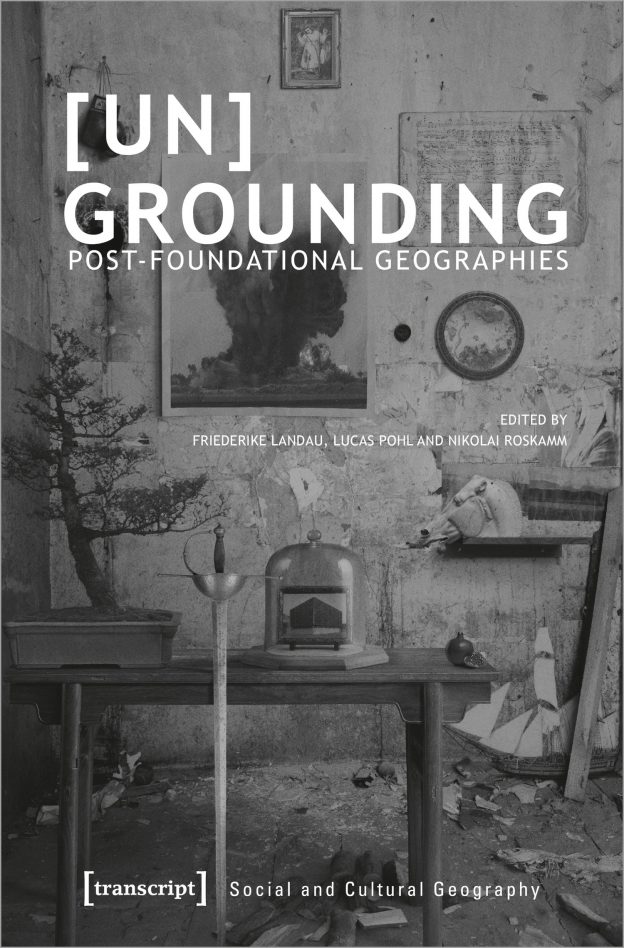Post-foundationalism as a theoretical perspective in the social sciences is based on the epistemological assumption that in the social world, no ultimate foundation exists. This volume aims to promote post-foundationalism and its relevance for social geography, particularly urban studies. To achieve its aim, it presents 15 thematic chapters structured across three parts, as well as the editors’ introduction. The first part deals with theoretical encounters, the second with geographies, and the third with urban issues.
The introduction in a profound and well-informed way outlines what is understood by post-foundationalism. It discusses the genealogy of the term, its theoretical references, and places it in relation to poststructuralism and post-Marxism. Following Oliver Marchart’s appraisal of post-fundamentalisms as being based on ‘left-Heideggerianism’ (p. 16), one section of the introduction engages in a well thought-through and courageous manner with Heidegger’s ontological difference. Overall, the chapter provides an excellent introduction to the basic precepts of post-foundationalism.
Nonetheless, two important aspects remain blurred for me (although this is probably simply because they are beyond the scope of an introduction): (1) post-foundationalism’s political agenda; and (2) its positioning within or in relation to Marxism. If post-foundationalism is considered a ‘leftist social theory’ (p. 15), one might expect it to go hand in hand with a political agenda and to link its theoretical reflections to political implications and claims. This pertains all the more if it is committed ‘to thinking and acting in a Marxian tradition’ (ibid.), as the editors put it. And yet there is astonishingly little engagement with Marxist theory and practice in the book as a whole.
In Part I, the volume’s theoretical section, five chapters engage with key theorists, aiming to illuminate why, in the authors’ view, they can be read as post-foundationalist thinkers: Lacan, Gibson-Graham, Lefebvre, Badiou and Rancière. As Jens Kaae Fisker puts it in his chapter: ‘Gibson-Graham has never actually referred to herself as a post-foundationalist—preferring the term anti-essentialist Marxist—but, as I shall soon convey, her kinship to post-foundationalism is so obvious that it is hardly problematic to read her work as a post-foundational endeavour’ (p. 64). This I would not necessarily dispute—but why should I read Gibson-Graham’s work as post-foundational? Although Fisker’s chapter is excellent, it does not become obvious to me what will be achieved by taking Gibson-Graham as a post-foundational thinker instead of adhering to the theoretical attribution she herself identified with. Seen from this angle, it might be more persuasive to outline what post-foundational thinking can take from Gibson-Graham’s work, rather than to claim her work as being a ‘post-foundational endeavour’.
The same applies, in general terms, to the other chapters in this section, where the post-foundationalist interpretation of certain thinkers who are rarely linked to post-foundational theory (specifically Lefebvre, in the chapter by Nikolai Roskamm) comes as more of a surprise than others who are frequently referred to in post-foundational debates (such as Badiou in Matthew Hannah’s contribution, or Rancière in the chapter by Mark Davidson and Kurt Iveson). The above notwithstanding, all these chapters unequivocally present sophisticated and instructive insights into the thinking of their respective theorists.
The sixth theoretical chapter, by Oliver Marchart, deals with Laclau’s discourse theory and his concept of antagonism. Remarkably, whereas the other contributions intensively refer to the notion of post-foundationalism, Marchart—who himself coined the term—hardly uses it. This might be due to the fact that his contribution was not written specifically for this book but is a reprint of a 2014 journal article. Rather than being a paper on post-foundationalism, it is (even better) an excellent piece on Laclau and his links to phenomenology, and on how Laclau’s concepts—namely antagonism—can be ‘translated into spatial theory’ (p. 111).
The contributors to Part II ‘(Un)Grounding Geographies’ and Part III ‘Post-Foundationalism in the City’ seek to relate the theoretical reflections at the intersection of post-foundational and spatial theory to the empirical analysis of topics in the fields of architecture and urban studies and in social geography more generally. For example, Friederike Landau refers to Mouffe’s concept of agonism to analyse what she conceives as ‘radical museums’. The contributions in Part II specifically cross thinkers who provide the main reference points in human geography (Fredric Jameson, for example) with post-foundationalist or poststructuralist theorists such as Lacan and Žižek (see Clint Burnham on ‘Fredric Jameson and Political Space’ and Lucas Pohl and Paul Kingsbury on ‘The Most Sublime Geographer’).
In Part III, the contributors make creative use of a wide range of theorists to understand urban phenomena: Gabu Heindl and Drehli Robnik build on Kracauer’s concept of non-solution, Anneleen Kenis and Matthias Lievens refer to Laclau and Sartre to analyse the impacts of air pollution and climate change in cities, and Sören Groth applies de Certeau to the analysis of urban mobility.
The major achievement of this book is its brilliant introduction to and engagement with all these major theorists—whether we call them post-foundationalist, poststructuralist or post-Marxist. Moreover, it succeeds in relating them to spatial theory and to recent work in social geography and urban studies. Nonetheless, while the volume’s theoretical encounter between post-foundationalism and spatial theory proves extremely productive—introducing new ideas to the respective theoretical debates and to spatial theory in particular—the same cannot be said of the attempt to translate this into an equally productive and coherent framework for empirical analysis.
Bettina Engels is a visiting Professor for African Politics and Societies at the Cluster of Excellence Contestations of the Liberal Script (SCRIPTS), and a Professor at Freie Universität Berlin.
Friederike Landau, Lucas Pohl and Nikolai Roskamm (eds.). (Un)Grounding: Post-Foundational Geographies. Bielefeld: Transcript Verlag. © 2021. Cover used with permission of Transcript Verlag.
Views expressed in this section are independent and do not represent the opinion of the editors.

